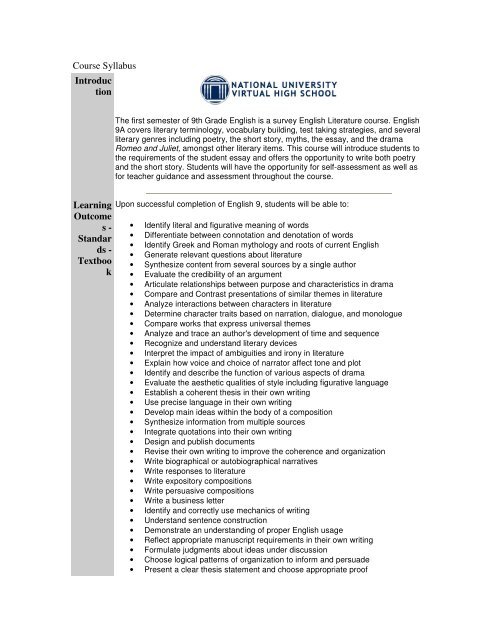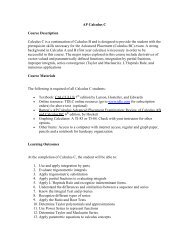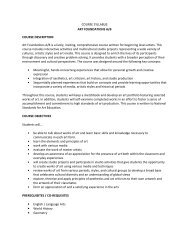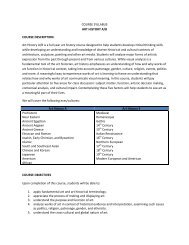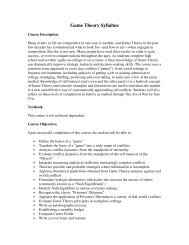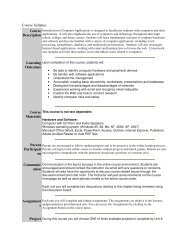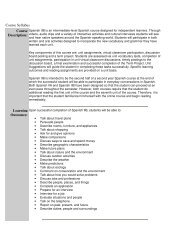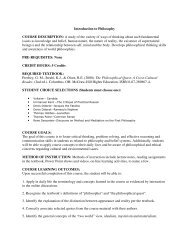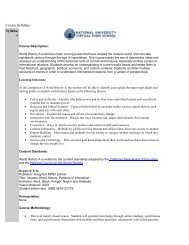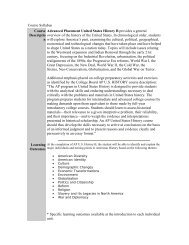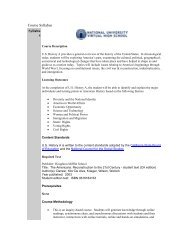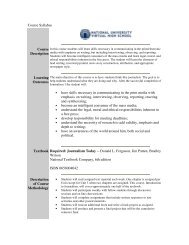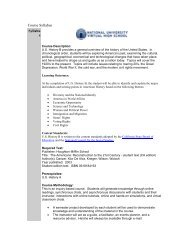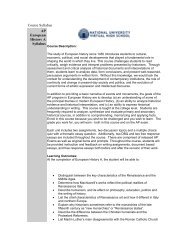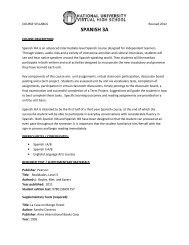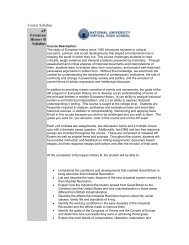English 9A Syllabus - National University Virtual High School
English 9A Syllabus - National University Virtual High School
English 9A Syllabus - National University Virtual High School
You also want an ePaper? Increase the reach of your titles
YUMPU automatically turns print PDFs into web optimized ePapers that Google loves.
Course <strong>Syllabus</strong><br />
Introduc<br />
tion<br />
The first semester of 9th Grade <strong>English</strong> is a survey <strong>English</strong> Literature course. <strong>English</strong><br />
<strong>9A</strong> covers literary terminology, vocabulary building, test taking strategies, and several<br />
literary genres including poetry, the short story, myths, the essay, and the drama<br />
Romeo and Juliet, amongst other literary items. This course will introduce students to<br />
the requirements of the student essay and offers the opportunity to write both poetry<br />
and the short story. Students will have the opportunity for self-assessment as well as<br />
for teacher guidance and assessment throughout the course.<br />
Learning<br />
Outcome<br />
s -<br />
Standar<br />
ds -<br />
Textboo<br />
k<br />
Upon successful completion of <strong>English</strong> 9, students will be able to:<br />
• Identify literal and figurative meaning of words<br />
• Differentiate between connotation and denotation of words<br />
• Identify Greek and Roman mythology and roots of current <strong>English</strong><br />
• Generate relevant questions about literature<br />
• Synthesize content from several sources by a single author<br />
• Evaluate the credibility of an argument<br />
• Articulate relationships between purpose and characteristics in drama<br />
• Compare and Contrast presentations of similar themes in literature<br />
• Analyze interactions between characters in literature<br />
• Determine character traits based on narration, dialogue, and monologue<br />
• Compare works that express universal themes<br />
• Analyze and trace an author's development of time and sequence<br />
• Recognize and understand literary devices<br />
• Interpret the impact of ambiguities and irony in literature<br />
• Explain how voice and choice of narrator affect tone and plot<br />
• Identify and describe the function of various aspects of drama<br />
• Evaluate the aesthetic qualities of style including figurative language<br />
• Establish a coherent thesis in their own writing<br />
• Use precise language in their own writing<br />
• Develop main ideas within the body of a composition<br />
• Synthesize information from multiple sources<br />
• Integrate quotations into their own writing<br />
• Design and publish documents<br />
• Revise their own writing to improve the coherence and organization<br />
• Write biographical or autobiographical narratives<br />
• Write responses to literature<br />
• Write expository compositions<br />
• Write persuasive compositions<br />
• Write a business letter<br />
• Identify and correctly use mechanics of writing<br />
• Understand sentence construction<br />
• Demonstrate an understanding of proper <strong>English</strong> usage<br />
• Reflect appropriate manuscript requirements in their own writing<br />
• Formulate judgments about ideas under discussion<br />
• Choose logical patterns of organization to inform and persuade<br />
• Present a clear thesis statement and choose appropriate proof
• Use electronic media to enhance presentations<br />
• Analyze the audience for their work<br />
• Assess how language affects the mood and tone of communication<br />
Content Standards:<br />
<strong>English</strong> <strong>9A</strong> is written to the content standards adopted by the California State Board<br />
of Education and the <strong>National</strong> Council of Teachers of <strong>English</strong>.<br />
Required Text:<br />
Publisher: Pearson Prentice Hall<br />
Title: Literature Timeless Voices, Timeless Themes--Gold Level<br />
Author(s): Kinsella, Carroll, Feldman, Stump, Wilson<br />
Year published: 2002<br />
Student edition text: ISBN 0130547891<br />
Prerequisites:<br />
None<br />
Descripti<br />
on of<br />
Class<br />
Methodo<br />
logy<br />
• This is an inquiry-based course. Students will generate knowledge through<br />
online readings, synchronous chats, asynchronous discussions with students<br />
and their instructor, interactions with online tutorials, and online and hands-on<br />
simulations.<br />
• A semester project developed by each student will be used to demonstrate<br />
knowledge and understanding of the material in the course.<br />
• The instructor will act as a guide, a facilitator, an events planner, and a<br />
resource advisor. He/she will always be available through e-mail.<br />
• The student must actively construct and acquire knowledge by being<br />
intrinsically motivated to succeed. To succeed, students must participate and<br />
complete all readings and activities. This course requires the student’s active<br />
participation.<br />
• Both formal and informal assessment methods will be used in the course.<br />
Informal assessment will include an evaluation of the quality and timeliness of<br />
participation in class activities. Formal assessment may include multiplechoice<br />
quizzes, tests, discussion board participation, and written<br />
assignments. A final exam will be given at the end of the course.<br />
Topics Activities Readings<br />
Mythology<br />
Characterization<br />
eme and<br />
Vocabulary<br />
Discussion<br />
Journals<br />
Essay<br />
Vocabulary<br />
Discussion<br />
Journals<br />
Essay<br />
Begin Semester Project<br />
Vocabulary<br />
Discussion<br />
Journals<br />
Myths - Several<br />
The Most Dangerous Game<br />
Casey at the Bat<br />
The Red Headed League<br />
Lincoln Preface<br />
I Have A Dream<br />
Rosa Parks
4 Irony and<br />
Predictions<br />
5 Romeo and<br />
Juliet<br />
6 Romeo and<br />
Juliet<br />
Essay<br />
Continue Semester Project<br />
Vocabulary<br />
Discussion<br />
Journals<br />
Essay<br />
Business/Persuasive Letter<br />
Midterm<br />
Continue Semester Project<br />
Vocabulary<br />
Discussion<br />
Journals<br />
Essay – Pre-writing for Unit 6<br />
Continue Semester Project<br />
Vocabulary<br />
Discussion<br />
Journals<br />
Essay – Final Version<br />
Continue Semester Project<br />
7 Non Fiction Vocabulary<br />
Discussion<br />
Journals<br />
Essay<br />
Continue Semester Project<br />
8 Assessment and<br />
Closure<br />
Vocabulary<br />
Discussion<br />
Journals<br />
Essay<br />
Project Submission and Discussion<br />
Final Exam – Three Part<br />
Self-Assessment<br />
There Is A Longing<br />
The Road Not Taken<br />
To Be Of Some Use<br />
Slam, Dunk, and Hook<br />
The Spearthrower<br />
Shoulders<br />
The Golden Kite, The Silver Wind<br />
Rules of the Game<br />
Joy, Luck, and Hollywood<br />
Checkouts<br />
Fifteen<br />
Sympathy<br />
Caged Bird<br />
We never know how high we are<br />
In My Place<br />
The Interlopers<br />
The Rug Merchant<br />
Romeo and Juliet<br />
Romeo and Juliet<br />
Caucasian Mummies Mystify Chinese<br />
Single Room, Earth View<br />
The Washwoman<br />
On Summer<br />
A Celebration of Grandfathers<br />
Reading Projects of Fellow Students<br />
Assessm<br />
ent<br />
Type of Assessment<br />
Discussion Board Prompts<br />
Assignments<br />
Major Writing Assignments<br />
Midterm<br />
Problem Solving Project<br />
Final Exam - Vocabulary<br />
Final Exam - Reading<br />
Final Exam - Literary Terms<br />
Points<br />
2 points per unit<br />
1 point each<br />
5 points each<br />
10 points<br />
10 points<br />
10 points<br />
10 points<br />
10 points
Grading Scale<br />
Letter Grade Percentage Earned<br />
A 90% - 100%<br />
B 80% - 89%<br />
C 70% - 79%<br />
D 60% - 69%<br />
F<br />
59% and lower<br />
Student’ Expectations:<br />
s Role<br />
and<br />
Responsi<br />
bilities in<br />
this<br />
Course<br />
Students are expected to conduct themselves in a responsible manner that reflects<br />
sound ethics, honor, and good citizenship. It is the student’s responsibility to maintain<br />
academic honesty and integrity and to manifest their commitment to the goals of<br />
NUVHS through their conduct and behavior. Students are expected to abide by all<br />
NUVHS policies and regulations. Any form of academic dishonesty, or inappropriate<br />
conduct by students or applicants may result in penalties ranging from warning to<br />
dismissal, as deemed appropriate by NUVHS.<br />
Communication:<br />
Throughout this course students will need to be in close contact with their instructor<br />
and fellow students. Students are expected to communicate via email and electronic<br />
discussion boards. Therefore, students should plan on checking email at least three<br />
times a week and participate in the discussion boards during the weeks they are live.<br />
Instructors strongly encourage and welcome open communication. Clear, consistent,<br />
and proactive communication will ensure a successful experience in this course. It is<br />
the student’s responsibility to notify the instructor immediately if and when a personal<br />
situation occurs that affects his/her performance in this class. Being proactive with<br />
communication will result in a quick solution to any problems that may occur.<br />
Technical Support is offered through Spectrum Pacific Learning Company (SPLC).<br />
Should a student need any technical assistance, he/she should email the Help Desk<br />
as soon as possible at helpdesk@myonlinelogin.com or call 1-877-533-4733. SPLC<br />
will help resolve technical problems and walk through the solution with students. If a<br />
problem persists for more than 48 hours, the student must also notify his/her<br />
teacher(s) and NUVHS.<br />
Time Required For This Course:<br />
To finish this course in eight weeks, students should plan to allocate at least 12-15<br />
hours a week on assigned readings, assignments, discussions (asynchronous and<br />
synchronous), quizzes, and exams. It is highly recommended that students organize<br />
themselves around the course schedule.<br />
NUVHS wishes every student great success in their online class. Please contact us<br />
at 1.866.366.8847 if any questions arise.<br />
NUVHS<br />
Expected<br />
NUVHS Expected <strong>School</strong>wide Learning Results (ESLRs):
<strong>School</strong>wi It is anticipated that NUVHS students will be:<br />
de<br />
Learning Engaged Learners<br />
1. Demonstrate self-directed learning skills such as time management, and personal<br />
Results<br />
responsibility through the completion of course requirements<br />
(ESLRs) 2. Develop an understanding of their own preferred learning styles to enhance their<br />
overall academic potential<br />
3. Incorporate effective and relevant internet and multimedia resources in their learning<br />
process to broaden their knowledge base<br />
Critical Thinkers<br />
1. Effectively analyze and articulate sound opinions on a variety of complex concepts<br />
2. Illustrate a variety of problem-solving strategies that strengthen college preparation and<br />
workforce readiness<br />
3. Formulate a framework for applying a variety of technology and internet-based<br />
research to enhance information literacy and collaborative thinking<br />
Effective Communicators<br />
1. Demonstrate awareness and sensitivity to tone and voice in multiple forms of<br />
communication<br />
2. Express concepts and ideas in a variety of forms<br />
3. Enhance communiccation skills through the use of media rich or other technology<br />
resources<br />
Global Citizens<br />
1. Appreciate the value of diversity<br />
2. Understand the range of local and international issues facing today's global community<br />
3. Demonstrate awareness of the importance of cultural sensitivity and social<br />
responsibility in the 21st century


